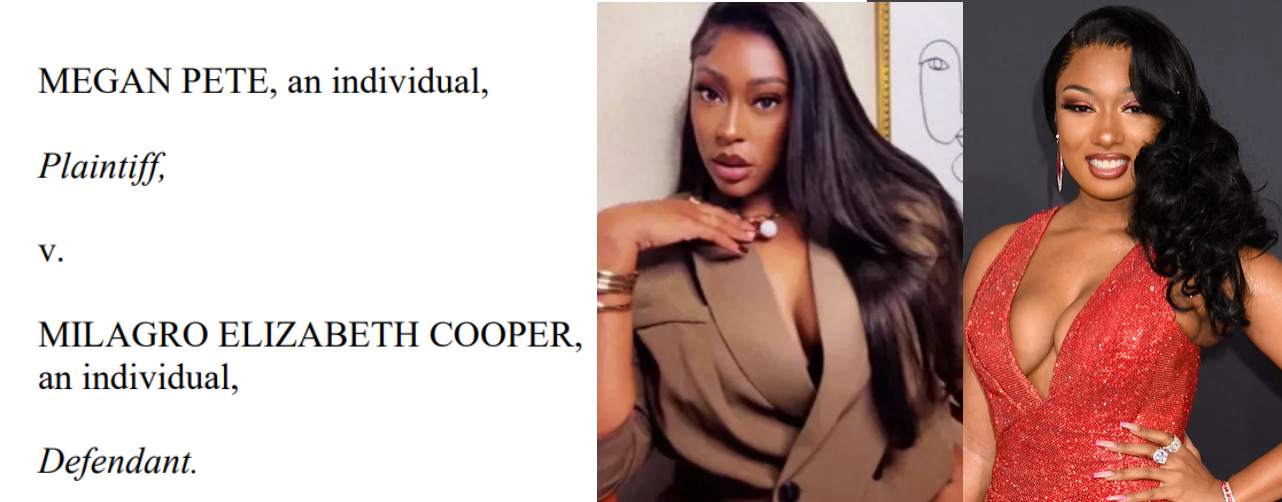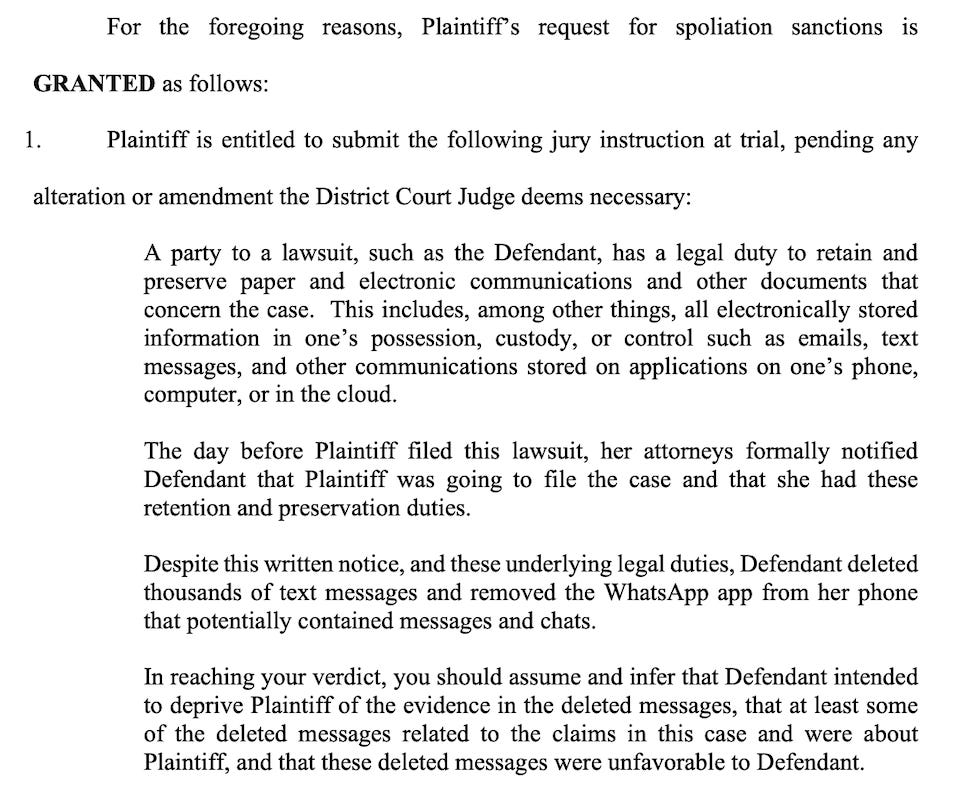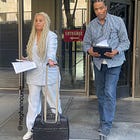Trial begins Monday in Megan Thee Stallion's federal defamation lawsuit. Here's a primer.
I'm going to Florida to cover the jury trial in the rapper's federal lawsuit against an online commentator accused of working with imprisoned rapper Tory Lanez to defame her.
Trial begins Monday in Miami in a federal defamation lawsuit against an online commentator accused of harassing rapper Megan Thee Stallion.
The lawsuit accuses Milagro Cooper of coordinating with Tory Lanez, the imprisoned rapper convicted of shooting Megan and injuring her feet in 2020, to wage a campaign of harassment to discredit and intimidate her for testifying against Lanez at his assault trial in Los Angeles in 2022.
Prospective jurors will be questioned about their knowledge of Lanez’s criminal case and their opinions about Megan and Lanez.
Milagro and Megan are expected to testify. Jurors also will see video excerpts of testimony Lanez gave in a pre-trial deposition, and they’ll see deposition excerpts from other witnesses such as popular online commentators Adin Ross and DJ Akademiks.
I’m going to Florida to watch the trial in person. I’ll be writing articles for this Substack and posting video updates on YouTube, TikTok and Instagram, so get ready for a lot of trial coverage. In the meantime, here’s a breakdown of a case that could affect the future of online media and commentary, particularly in the hip-hop industry.
The parties
The plaintiff: Legal name Megan Pete, Megan Thee Stallion is a 30-year-old rapper and hip-hop artist from Houston, Texas.
She was the victim of a shooting in Los Angeles on July 12, 2020, in which rapper Daystar “Tory Lanez” Peterson fired five rounds at her after she got out of an SUV after they left reality star Kylie Jenner’s Hollywood Hills home. Surgeons at Cedars-Sinai Medical Center in LA removed bullet fragments from Megan’s feet.
Lanez is serving 10 years in prison after a jury on Dec. 23, 2022, convicted him of first-degree assault with a firearm, negligent discharge of a firearm and possession of a concealed and unregistered firearm in a vehicle. The California Court of Appeals affirmed his conviction in a 46-page opinion filed on Nov. 12.
The defendant: Milagro Cooper is a 38-year-old online commentator who hosts a regular talk show through the platform Stationhead called Mobz Radio. She told Megan’s lawyers in a deposition that Stationhead pays her $6,300 each month to stream five days a week for at least three hours each day. She also testified she typically earns $5,000 to $10,000 monthly from the Twitch streaming service.
The claims
Megan has four claims against Milagro: defamation, promotion of an altered sexual depiction, intentional infliction of emotional distress and cyberstalking. UPDATE: The cybestalking claim is no longer. The trial is about only the defamation, intentional infliction of emotional distress and altered depiction claims.
The promotion of an altered sexual depiction claim is based on a law the Florida Legislature enacted in 2024 that imposes civil and criminal penalties for people who “willfully and maliciously” promote a sexual depiction of an identifiable person that has been altered.
According to the most recent complaint, filed on Feb. 10, Milagro in June 2024 liked a post on X, formerly known as Twitter, that included a video of Megan made with artificial intelligence. She then posted, “Go to my likes”, which the lawsuit says she intended “to encourage her followers and other members of the public to watch the Deepfake Video, which had been added to her ‘Likes’ page around the same time.” Milagro also told her Stationhead followers in a livestream to visit her “likes” on X.
U.S. District Judge Cecilia M. Altonaga in the Southern District of Florida rejected a dismissal motion from Milagro’s lawyers in February 2024.
Her 25-page order says Milagro does not qualify as a “media defendant” so Megan’s lawyers were not required under Florida law to notify her of a potential libel or slander action before they sued her.
Judge Altonaga said Milagro’s statements that Megan alleges defamed her “go beyond casual name-calling.”
“Given that a reasonable person could interpret Defendant’s statements as accusations of perjury, mental incapacity, and alcoholism, the Court finds they are actionable as defamation per se,” the judge wrote in a 25-page order.
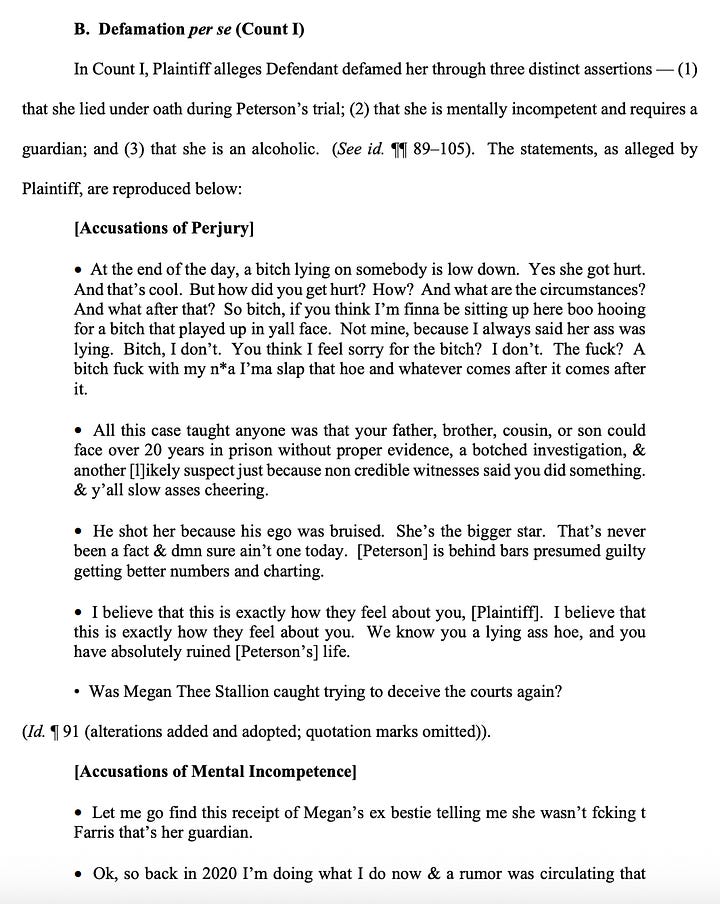
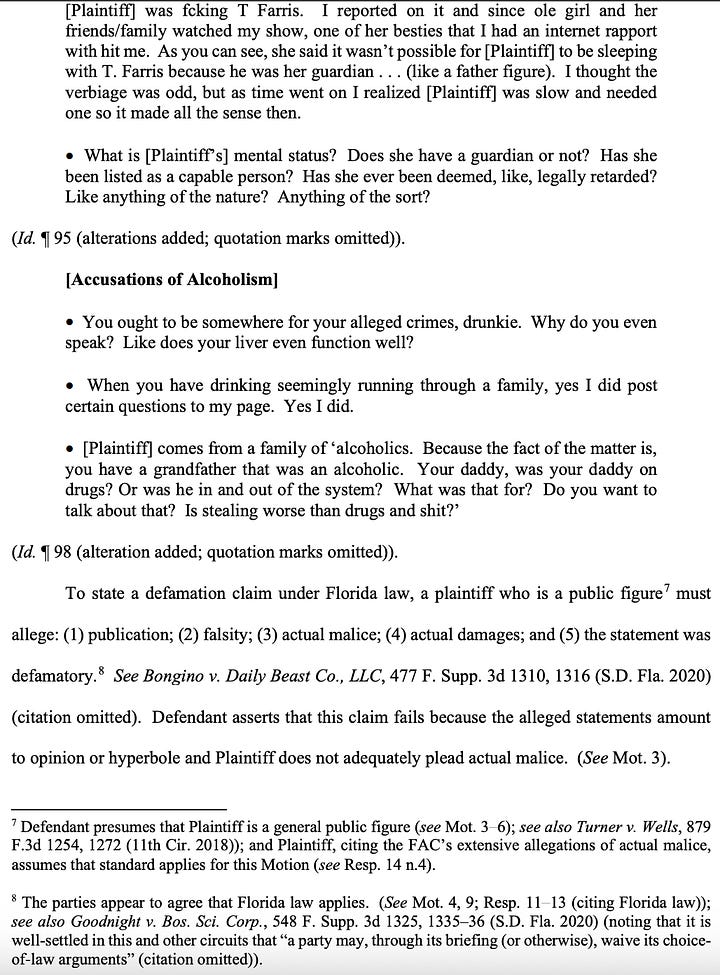
It’s not clear how much money in damages Megan is seeking, but her lawyers recently filed a brief arguing that the defamation claim doesn’t require proving actual financial loss.
“Federal and state courts applying Florida law have repeatedly allowed public figures to proceed on claims of defamation per se without requiring proof of economic harm,” according to the filing. “Florida precedent makes clear that once a public figure demonstrates actual malice, the traditional presumption of damages in per se defamation remains intact.”
Milagro’s lawyers cited a 1985 Florida Supreme Court case they said “rejected the common-law rule that presumed damages flow automatically from defamatory statements categorized as defamatory per se.”
“Florida no longer recognizes presumed damages in defamation per se claims against media defendants, unless the plaintiff first proves actual malice,” according to the brief. “And even where actual malice is shown, Florida courts require competent evidence of resulting injury; damages are not presumed by virtue of the per se label.”
But Megan’s lawyers say Milagro isn’t a media defendant because nothing has changed since Judge Altonaga’s order that she’s not media and thus didn’t need to be notified of a possible civil action.
“Defendant’s function has never been to impartially disseminate information or inform on matters of public interest,” according to the brief. “Rather, Defendant’s spread of misinformation, charged commentary on matters that lack a connection with the public interest (such as Ms. Pete’s alleged mental status or family background), and evidence of Defendant being commissioned by the Petersons to publish her statements all underscore Defendant’s non-media status.”
The brief asks Judge Altonaga to “hold that the Defendant is indeed a non-media defendant.” She had not addressed the request as of Saturday.
Megan’s and Milagro’s lawyers filed a proposed verdict form that asks seven questions.
Question 1: Do you find, by a preponderance of the evidence, that Ms. Cooper defamed Ms. Pete by accusing Ms. Pete of perjury—a felony—by lying under oath in a criminal trial?
Question 2: Do you find, by a preponderance of the evidence, that Ms. Cooper willfully and maliciously promoted, without Ms. Pete’s consent, a visual depiction of Ms. Pete that she knew or reasonably should have known was an altered sexual depiction?
Question 3: Do you find, by a preponderance of the evidence, that Ms. Cooper intentionally or recklessly engaged in extreme and outrageous conduct toward Ms. Pete?
Question 4: Do you find, by a preponderance of the evidence, that Ms. Pete suffered severe emotional distress as a result of Ms. Cooper’s extreme and outrageous conduct?
If the jury answers yes to any of the four questions, they will answer questions about damages:
Question 5: Do you find, by a preponderance of the evidence, that Ms. Pete should be awarded compensatory damages against Ms. Cooper?
If your answer is “Yes,” in what amount:
Question 6: If you found that Ms. Pete is not entitled to compensatory damages, do you find, by a preponderance of the evidence, that Ms. Pete should be awarded nominal damages against Ms. Cooper?
If your answer is “Yes,” in what amount:
Question 7: Do you find, by clear and convincing evidence, that punitive damages are warranted against Ms. Cooper on Ms. Pete’s defamation and/or intentional infliction of emotional distress claims?
If your answer is “Yes,” in what amount:
The lawsuit is reminiscent of rapper Cardi B’s federal defamation lawsuit against online commentator Tasha K, which went to trial in the Northern District of Georgia in 2022 and resulted in a jury ordering Tasha pay Cardi $4 million for defamation, invasion of privacy, and intentional infliction of emotional distress. Tasha K agreed in bankruptcy court to pay Cardi $1.2 million over five years.
Rapper Nicki Minaj also settled a federal defamation lawsuit in 2024 against online commentator Marley “Nosey Heaux” Green.
Green apologized and admitted her statements about Minaj using and/or abusing cocaine were false. She also agreed to never say anything about Minaj being “engaged in conduct which reflects poorly on Maraj’s integrity,” according to the settlement agreement, referring to Minaj’s legal name, Onika Maraj, and she can’t quote anyone else who does or mention “directly or indirectly, Maraj’s husband or child in public.” If she does, she has to pay Minaj $50,000 for each violation.
The sanctions
Jurors will be specially instructed that, despite a written notice to preserve all electronic communications, Milagro “deleted thousands of text messages and removed the WhatsApp app from her phone that potentially contained messages and chats,” according to an order from Judge Reid.
The sanction followed testimony from Matias Livachof, a digital forensics expert with FTI Consulting, in an evidentiary hearing on Aug. 7 about tens of thousands of text messages deleted from Milagro’s phone, including messages with Lanez and Lanez’s father. The deletions occurred after Megan sued Milagro.
Some of the deleted texts were sent on Oct. 30, 2024, one day after Milagro received a letter ordering her to preserve all electronic communications. Judge Altonega’s Oct. 9, 2025, sanctions order quotes Milagro’s deposition in which she “was unable to provide a reason why the messages from Sonstar [Lanez’s father] appear in the recently deleted folder.”
“While Defendant testified that she often goes on a trip in November and sometimes deletes messages to make space in her phone for the trip, she stopped just short of stating that Sonstar’s messages were deleted for such reason,” according to the order.
“And while she stated she never thought to purposefully delete messages from Sonstar, objective evidence of the deleted messages with no viable explanation from Defendant gives the Court reason to doubt the credibility of that statement,” the order continues. “Indeed, though Defendant testified during her deposition that she stopped communicating with Sonstar following the commencement of the instant lawsuit, her phone records show differently.”
The judge said she “can infer that at least some of these messages would have been relevant to the case.”
Milagro also deleted the WhatsApp messaging platform from her phone in April 2025 after receiving two preservation letters in March.
Milagro said in her deposition that she tried her best to keep message she “felt like [were] important,” which Judge Reid called “not good enough.”
“Defendant was on notice of her duty preserve all evidence related to this case, not just what she ‘felt’ was relevant,” according to the order. “She was specifically told to retain all communications with and related to Daystar and Sonstar. She failed to take reasonable steps to do so.”
Milagro’s lawyer argued that imposing sanctions without knowing the contents of the deleted messages would result in a “per se” spoliation ruling for every case with a deleted message, but the judge said that interpretation “risks the exact opposite.”
“Namely, parties would be able to delete or destroy evidence and avoid sanctions by claiming the court and prejudiced party do not know the missing evidence to be ‘crucial,’” the judge wrote.
Judge Reid determined Milagro purposely deleted the messages to interfere in the case, which allowed her to impose the severe sanction of an adverse jury instruction. She also ordered Milagro to pay Megan “the reasonable amount of fees and costs incurred to bring the spoliation issue to the Court’s attention, including the costs incurred as a result of the evidentiary hearing.”
Reid rejected proposed language from Megan’s lawyers and decided on the following:
The witnesses
Several witnesses already have testified through depositions, including Lanez. Megan’s lawyers wanted him held in contempt for what they described in April as “egregious conduct” during a video deposition from prison.
U.S. Magistrate Judge Lisette M. Reid in August ordered Lanez pay Megan’s attorney fees for the deposition and said she’d supervise the remainder.
Lanez refused to be deposed again on Sept. 15, and his lawyer Crystal Morgan sought a protective order in Los Angeles federal court to prevent further deposition, arguing his testimony would infringe his 5th Amendment constitutional right against self-incrimination. U.S. District Judge George H. Wu in the Central District of California denied the motion after a 20-minute hearing on Oct. 16 and referred the issue to the Southern District of Florida where the defamation is filed.
Judge Reid in Miami rejected Morgan’s new request for a protective order or to quash Lanez’s subpoena. Her Oct. 30 order that called his 5th Amendment objections “unavailing.”
“The focus of Mr. Peterson’s deposition is his relationship with Defendant Cooper, not with Plaintiff,” Reid wrote. “Thus, the Court does not see how testimony regarding Mr. Peterson’s communications and relationship with Defendant would serve to prejudice his criminal appeal.”
Reid ordered Lanez to continue his deposition under her supervision “at a date agreed upon by all parties.”
Reid also ordered popular online streamer Adin Ross to sit for a deposition the week of Nov. 10 after his lawyer, Bradford Cohen of Cohen & McMullen, P.A. in Fort Lauderdale, Florida, tried to quash his subpoena. Cohen said Megan’s team “hired a mariachi band to play music outside his home to lure Ross and serve him. This was too clever by half, or should we say: Pasarse de listo.”
“Personal service was not made. Mr. Ross has security, who does not reside with him, to shoo the band away. The security officer was not authorized to accept service. The mariachi band stunt trivialized the judicial process and was meant to harass and embarrass,” Cohen wrote.
The online streamer DJ Akademiks, legal name Livingston Allen, has publicized several video excepts from his deposition. Megan’s lawyers in September asked a judge to order him to comply with a subpoena after he refused to say who gave him a DNA report in Lanez’s case that he disclosed the same time Milagro did.
A motion filed in the District of New Jersey, where Akademiks resides, says he “confirmed he received the information through an ‘exclusive,’ but refused to name the source.”
“Identifying this source is essential to proving the coordination between Cooper and Peterson and exposing Cooper’s intent for perpetuating false and demeaning claims against Ms. Pete,” Megan’s lawyers wrote.
U.S. Magistrate Judge J. Brendan Day ordered Akademiks’ deposition be reopened for no more than 45 minutes and be restricted to questions related to his source of information “for the social media post at issue in paragraph 34 of the Second Amended Complaint in the Florida Action,” which is a post about the DNA report.
Akademiks appeared virtually from his home streaming studio for the previous deposition, but Judge Day ordered him to go to the Clarkson S. Fisher Federal Building & U.S. Courthouse in Trenton so the remaining deposition could take place in person.
Megan’s lawyers also sought sanctions against Lanez’s friend Ceasar McDowell, founder of the legal services group Unite the People, for conduct in a deposition that “went far beyond feigned forgetfulness.”
“On camera and under oath, Mr. McDowell rolled a cigarette filled with a substance resembling marijuana during questioning, then smoked it during a break. He demanded painkillers, threatened to urinate in the deposition room, called Plaintiff’s counsel a “b***h”, made inappropriate comments about her appearance, and walked out mid-questioning. His conduct shocked the conscience and made a mockery of this Court’s authority,” according to an Aug. 28 motion. “In fact, after his deposition concluded, his own attorney agreed that he should sit for another deposition that would be supervised by the Magistrate Judge in this case.”
Megan’s lawyers plan to play excerpts from the depositions in trial. A witness list filed Thursday also lists depositions from Antonio Tolefree and Lanez’s father, Sonstar Peterson, and expected in-person testimony from Megan and Milagro as well as Amiel Holland-Briggs, Sean McDermott, Travis Farris and Daniel Kinney.
Lenore Walker, a longtime psychologist known for her research on abused women, also will testify, according to the witness list. She testified in the first trial I remember covering gavel to gavel: the 2009 trial in Spokane County Superior Court in Washington state of Shellye Stark, a woman convicted of murder for the fatal shooting of her husband.
Megan’s exhibit list includes a text Milagro sent Holland-Briggs about a call from Lanez’s father, as well as dozens of Milagro’s audio streams ad social media posts discussing Megan and Lanez as well as her commentary about the defamation lawsuit.
Jurors also are expected to see evidence from Lanez’s trial, including his apologetic call from jail to Megan’s now-former friend Kelsey Harris.
The lawyers
For the plaintiff:
Megan is represented by a team of lawyers at Quinn Emanuel Urquhart & Sullivan, LLP.
The original complaint lists five attorneys: partner Olga Vieria and associate Daniel L. Humphrey in Miami, and partner Mari F. Henderson and associates Janet C. Shamilian and Julian T. Schoen in Los Angeles.
Associate Marie Hayrapetian in LA joined in February, and LA-based partner Robert M. Schwartz, who is co-chair of the form’s Media & Entertainment Industry Practice, joined in March.
Associate Bomie Lee in LA joined in July, and associate Stephanie Kelemen in LA joined on Nov. 8.
John F. O’Sullivan, a partner in Miami, joined the case in July and is the lead attorney. He is a 1988 graduate of George Washington University Law School in Washington, D.C., and a fellow with the invitation-only International Academy of Trial Lawyers.
According to his LinkedIn page, O’Sullivan joined Quinn in May 2021 from Hogan Lovells, where he was a partner from 2005 to 2021 after working as a partner at Akerman LLP from 1998 to 2005.
For the defendant:
Milagro was initially represented by Michael A. Pancier in Pembroke Pines, Florida, and Michael R. Hayden of Unite the People, the Long Beach-based legal services organization which lists Lanez as a member of its board of directors.
Pancier filed Milagro’s 21-page dismissal motion last December, and he filed her answer to the amended complaint. But he quit representing her in May 2025, writing in a four-page on May 15 filing that Milagro and Unite the People “have not met their financial obligations to compensate Undersigned Counsel to continue to act as Local Counsel in this matter thereby rendering continued representation unreasonably difficult and a burden on Undersigned Counsel.”
Hayden quit 12 days later, saying Unite the People couldn’t secure counsel in Florida, which is needed to sponsor his pro race vice application, and cited “financial difficulties” at the organization and with him. Judge Altonaga ordered Milagro to find new counsel or begin representing herself by June 12. Miami-based lawyer Jeremy A. McLymont filed his notice of appearance on June 5, along with a pro hace vice application from LA-based lawyer Ronda Dixon.
McLymont has been a licensed attorney in Florida since 2018 after earning his law degree from Florida International University, College of Law in Westchester, near Miami. He founded Asilia Law Firm, PA, in 2021 after three years as a assistant public defender in Miami-Dade County.
McLymont recently represented Alicia Andrews in her murder trial over the January 2023 fatal shooting of rapper Charles “Julio Foolio” Jones in Tampa. A jury convicted Andrews of manslaughter, which was included as a lesser charge to first-degree murder and second-degree murder, and acquitted her of conspiracy to commit murder.
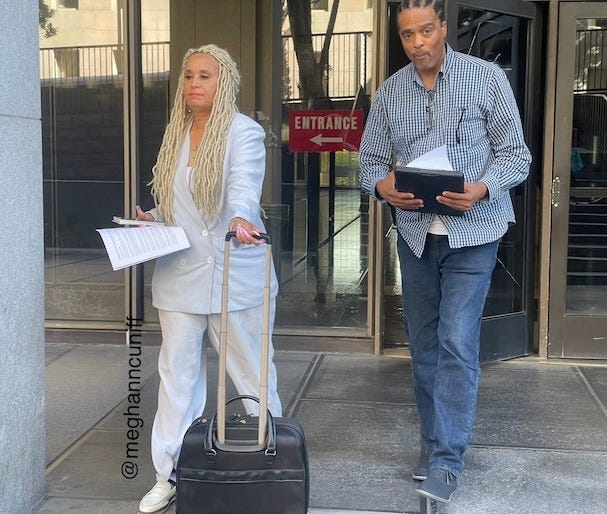
Dixon briefly appeared in Lanez’s case in July 2023 after she tried to take over his post-trial defense and filed a motion to release him from jail for cruel and unusual punishment. She visited him in jail and discussed her meeting with me in a phone call, but Lanez declined to hire her.
Nathacha Bien-Aime, a licensed attorney in Florida since 2019, joined Milagro’s team on Nov. 6. Laisa Ene Pertet, a licensed attorney in Florida since 2017 who works with McLymont, joined on Nov. 14.
The judges
Judge Reid handled discovery issues as the magistrate judge assigned to the case with Article III lifetime appointee Judge Altonaga.
Reid’s work has been influential: She’s the judge who decided to sanction Milagro for deleting texts by ordering a devastating special jury instruction that puts Milagro’s credibility and integrity squarely at issue.
Reid has been on the bench since Jan. 3, 2019, after the lifetime judges in the Southern District of Florida appointed her.
She was born in Trinidad and moved to the United States when she was six years old, according to the Miami-based Gwen S. Cherry Black Women Lawyers Association. Reid earned her law degree from University of Missouri School of Law in 1986. She worked in the civil and appellate divisions of the U.S. Attorney’s Office for the Southern District of Florida before she became a judge.
Judge Altonaga will preside over the trial. She was born in Baltimore, Maryland, graduated from Yale Law School in 1986. She was nominated to the bench in 2003 by President George W. Bush. She is the first Cuban-American woman to hold a federal judgeship in the United States.
She previously served as an assistant county attorney and a judge in Florida’s 11th Judicial Circuit.
Altonaga has been chief judge of the Southern District of Florida since 2021 and is the first woman to hold that role in the district’s 175 years of existence. She is married to lawyer George Mencio, who is a partner in Holland & Knight LLP’s Miami office and co-leader of the firms’s Corporate, Mergers & Acquisitions and Securities Practice Group.
My coverage
I’m more than excited to visit Florida for the first time and live a Carl Hiaasen novel for a couple weeks.
I’ll be at the Wilkie D. Ferguson, Jr. United States Courthouse in downtown Miami on Monday for jury selection, and I’ll be in court each day of the trial.
I obtained a media pass through the Southern District of Florida that allows me to bring my laptop into the courtroom for note-taking purposes. All federal courts should set up an application process for this, especially the Central District of California in Los Angeles.
I cannot transmit from the courtroom, but that’s OK. I’ll write articles on this Substack and share video updates on YouTube, TikTok and Instagram. I also may share a few updates from the courthouse on the website formerly known as Twitter.
Court documents, including transcripts of Milagro’s and Lanez’s depositions, are linked below for my paid subscribers. Your paid subscriptions make my work possible and keep me inside the courtroom.


